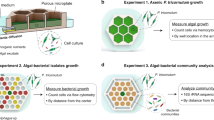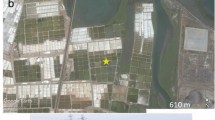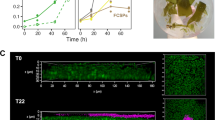Abstract
AN essential prerequisite to obtaining predictable growth of algae under laboratory conditions is the establishment of axenic cultures, but this is often extremely difficult to achieve. The successful use of potassium tellurite as a bacteriostatic agent1 in the pure isolation of representative aquatic fungi from the orders Blasto-cladiales, Chytridiales4 and Saprolegniales, using material direct from Nature which was sometimes highly contaminated with bacteria, suggested that algae might also respond to this treatment ; and the promising results obtained are reported in this communication.
This is a preview of subscription content, access via your institution
Access options
Subscribe to this journal
Receive 51 print issues and online access
$199.00 per year
only $3.90 per issue
Buy this article
- Purchase on SpringerLink
- Instant access to full article PDF
Prices may be subject to local taxes which are calculated during checkout
Similar content being viewed by others
References
Difco Manual, ninth ed. (Detroit, 1953).
Lewin, B. A., Rev. Alg. N.S., 4, 181 (1959).
Stosch, H. A. v., Naturwiss., 49, 42 (1962).
Willoughby, L. G., Ann. Bot., N.S., 26, 13 (1962).
Author information
Authors and Affiliations
Rights and permissions
About this article
Cite this article
DUCKER, S., WILLOUGHBY, L. Potassium Tellurite as a Bacteriostatic Agent in isolating Algae. Nature 202, 210 (1964). https://doi.org/10.1038/202210a0
Issue date:
DOI: https://doi.org/10.1038/202210a0
This article is cited by
-
Purification of Algal Cultures with Caffeine
Nature (1964)



